Breaking: Clean Air Committee this week in press and media
Jury verdict Dutch Sustainable 100
Laurie van der Burg:
“Comité Schone Lucht (Clean Air Committee) fights tirelessly and successfully against polluting biomass burning and for clean air for everyone. They managed to convince the government to stop subsidies for woody biomass immediately, which frees up money for truly sustainable solutions, such as energy savings, solar energy and heat pumps.”
text Frank Straver
photo Judith Jockel
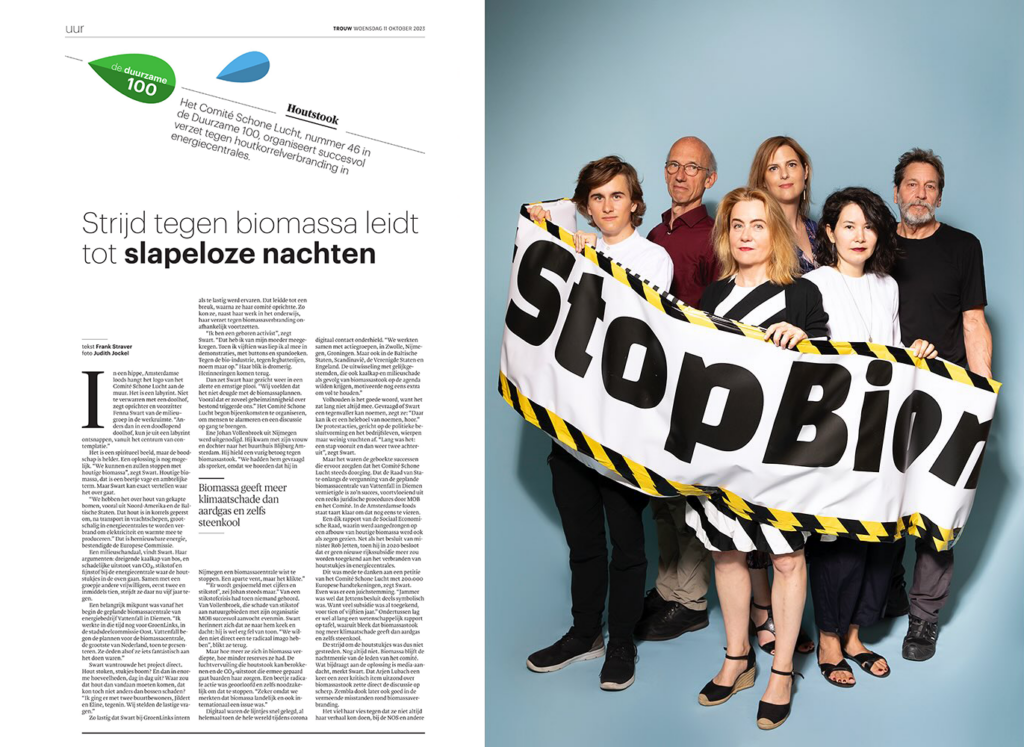
That’s not easy: “Sometimes I worry that we might be followed by the Eastern European mafia active in the biomass trade. That’s not a crazy idea. The economic and political interests are huge. This is David against Goliath. It did give me sleepless nights.” For protection, the members used code names among themselves.
In a hip Amsterdam warehouse the logo of the Clean Air Committee hangs on the wall. It is a labyrinth. Not to be confused with a maze, says founder and president Fenna Swart of the environmental group in the workspace. The environmental group she co-leads with Maarten Visschers. “Unlike a dead-end maze, you can escape from a labyrinth, from the center of contemplation.”
It’s a spiritual image, but the message is clear. A solution is still possible. “We can and will stop woody biomass,” says Swart. Woody biomass, that’s a somewhat vague and officious term. But Swart can tell exactly what it’s about.
“We’re talking about wood from harvested trees, mostly from North America and the Baltic States. That wood is pressed into pellets to be burned, after transport in cargo ships, on a large scale in power plants to produce electricity and heat.” That’s renewable energy, the European Commission perpetuated.
An international environmental scandal, Swart believes. Her arguments: threat of deforestation, and harmful emissions of CO2, nitrogen and particulate matter at the power plant where the wood pieces go into the furnace. Together with a group of other volunteers, first two and now ten, she has been fighting this for five years.
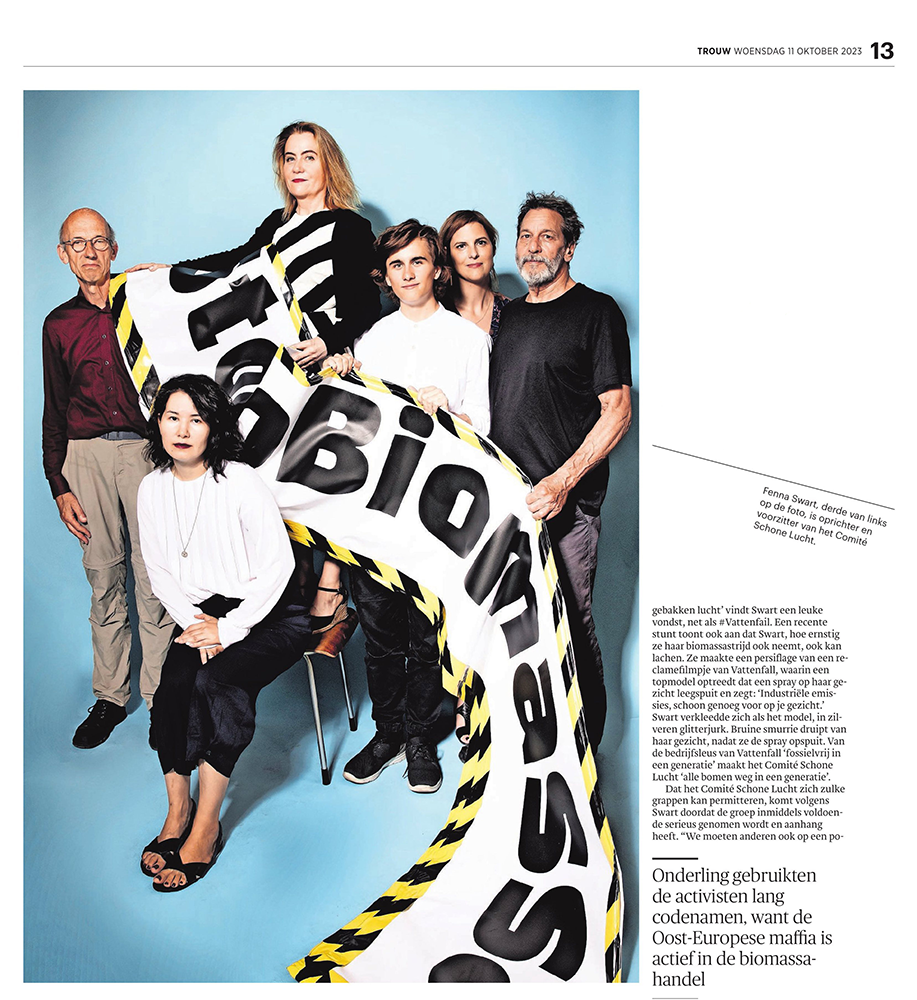
Diemen biomass power plant
A major target from the beginning was energy company Vattenfall’s planned biomass power plant in Diemen. “At that time I was still working for (the Dutch Greens) GroenLinks, in Amsterdam. Vattenfall started presenting the plans for the biomass power plant, the largest in the Netherlands, back then. They acted as if they were doing something fantastic.”
Swart immediately distrusted the project. Burning wood, pieces of trees? And then in huge quantities, day in and day out? Where was that wood supposed to come from, that couldn’t help but harm forests, right? “I went against it with two local residents, Jildert and Eline. We asked the tough questions.”
But Swart was perceived internally at the GroenLinks as too tough. That led to a split, after which she formed her Clean Air Committee. That way, in addition to her work in university, she could continue her opposition to biomass burning independently.
“I’m a born activist,” Swart says. “I got that from my mother. When I was fifteen I was already participating in demonstrations, with badges and banners. Against factory farming, against battery cages, animal suffering.”
Then Swart puts her face back into an alert and serious crease. “We felt that things were not right with the biomass plants. Especially that there was so much secrecy about it triggered us.” The Clean Air Committee began organizing meetings to alert people and start a discussion.
One Johan Vollenbroek from Nijmegen was invited. He came with his wife and daughter to the community center Blijburg in Amsterdam. He held an ardent plea against biomass firing. “We had asked him as a speaker because we heard that he managed to stop a biomass power plant in Nijmegen. An unusual guy, but it clicked.”
“‘Figures and nitrogen are being fiddled with,’ Johan kept saying.” No one had heard of a nitrogen crisis back then. Neither had Vollenbroek, who successfully challenged damage from nitrogen to natural areas with his organization MOB. Swart remembers looking at him and thinking: he does have a very fierce tone. “We didn’t want to have too radical an image right away,” she looks back.
But the more she delved into biomass, the fewer reservations she had. The air pollution that wood burning can cause and the CO2 emissions associated with it worried her. Some radical action was permissible and even necessary to stop it. “Especially since we noticed that biomass was an issue nationally and also internationally.”
Digitally, the lines were quickly established, especially when the whole world maintained digital contact during corona. “We worked together with action groups, in Zwolle, Nijmegen, Groningen. But also in the Baltic States, Scandinavia, the United States and England. The exchange with like-minded people, who also wanted to put clear-cutting and environmental damage caused by biomass burning on the agenda, motivated us even more to persevere.” The (inter)national digital network is now a voice of influence that cannot be ignored, created in 5 years from the grassroots.
Persevere is the right word, because things were far from always easy. Asked if Swart can name a setback, she says, “I can name a lot of those, mind you.” The protests, aimed at political decision-making and business, bore little fruit. “For a long time it was: one step forward and then two back again,” Swart says.
But it was the successes that kept the Clean Air Committee going. That the Council of State recently annulled the permit for Vattenfall’s planned biomass power plant in Diemen this summer, is one such success, stemming from a series of legal proceedings by MOB and the Committee. Cake is waiting in the Amsterdam shed to celebrate once again.
A thick report by the Social and Economic Council urging a phaseout of woody biomass was also seen as a boon. As was the decision of Minister Rob Jetten, when he decided in 2022 that no new government subsidy would be granted to burning wood pellets in power plants.
This was partly due to a petition from the Clean Air Committee with 200,000 European signatures, says Swart. For a while, there was jubilation. “It was unfortunate, however, that decision of the minister was partly symbolic. For much of the subsidy had already been granted, for ten or fifteen years.” Meanwhile, a scientific report had long been on the table, which showed that biomass firing causes even more climate damage than natural gas and even coal.
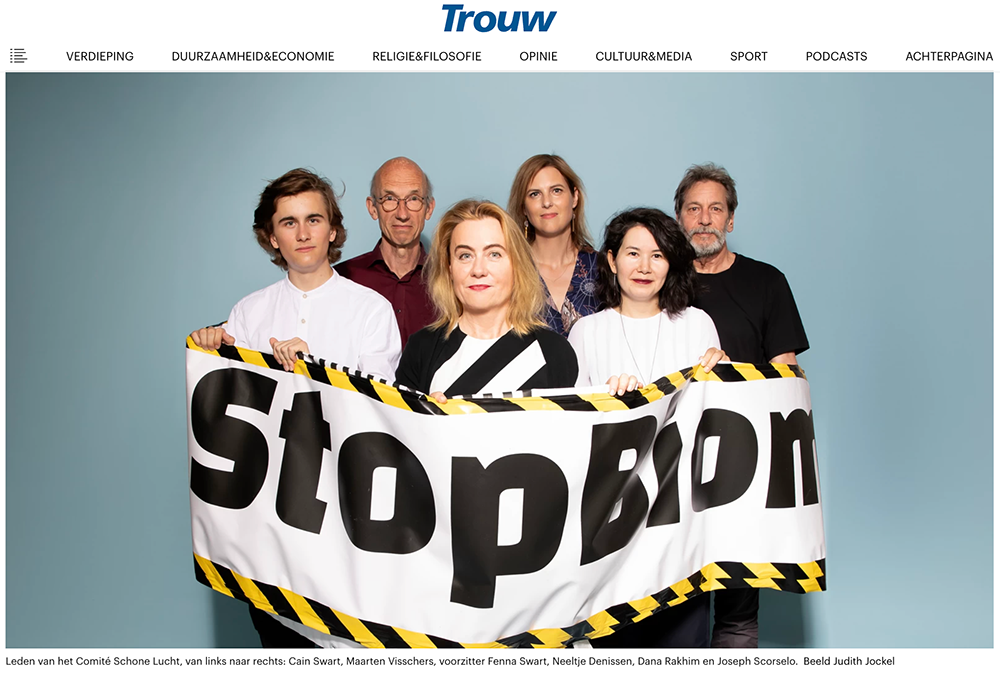
Action Journalism
So the battle for wood pellets was not over. Still not. Biomass remains the nightmare of committee members. What contributes to the solution is media attention, Swart notes. The fact that Arjen Lubach once broadcasted a highly critical item on biomass firing put the discussion on edge. The Dutch television research program Zembla later delved into the alleged abuses surrounding biomass burning.
She was not always able to tell her story, at NOS and other media. In Trouw and other newspapers she published several opinion pieces (56 in five years) in which she agitated against biomass, in news reports she was able to express concerns. But she could not express many protests and cries for help, not in the early years.
At Dutch De Telegraaf, however, she succeeded. The biggest Dutch national newspaper, known for action journalism, embraced the Clean Air Committee and frequently featured the protest group in its columns. That through these publications “her” committee, as Swart sees it, is also being framed by some as “against left-wing climate policy” she finds unfortunate and unjustified. “That puts you in a certain populist corner, but we are independent. We are not left or right but for transparent policies that are committed to human, animal and natural health.” According to Swart, many “mainstream media” and political parties have long taken the assumption that wood burning is a green resource, like wind and solar energy, at face value. She is pleased that Trouw Duurzame 100 rewards her foundation’s efforts. She could use a compliment, as could her teammates. Because it is a sacrifice, says Swart, to keep taking action. Budget is fortunately there, from crowdfunding and some funds, but according to the Clean Air Committee, resources are limited.
Biomass is about big interests
“I would like to focus entirely on action against biomass, but I can’t,” says Swart. We all also have day jobs and normal lives.
To keep up courage, humor is sometimes desperately needed, Swart says. When drafting protest slogans, the group therefore uses witticisms in addition to serious slogans (“Stop fake renewables”). ‘Stop Baked Air’ is a fun find for Swart, as is #Vattenfail. A recent stunt also shows that as serious as she takes her biomass battle, Swart can also laugh.
She made a parody of a Vattenfall commercial, in which a top model appears emptying a spray on her face and saying, “Industrial emissions, clean enough for your face. Swart dressed as the model, in silver glitter dress. Brown goo drips from her face after she sprays it on. From Vattenfall’s corporate slogan “fossil-free in a generation,” the Clean Air Committee turns “all trees gone in a generation”.
That the Clean Air Committee can afford such jokes, according to Swart, is because the group is now taken seriously enough and has a sufficient following. “We also have to wake others up in a positive way, just hammering doesn’t work.” In actions, therefore, the labyrinth keeps recurring: as a symbol of “reason and reflection,” chalked on the street. ‘Art action,’ Swart calls it.
She has a lot of notes to sing, to take the ban on biomass a step further. She wants to confront politicians with what she sees as the “destruction of ecosystems,” as trees are cut down and crushed on a large scale to serve as a source of energy. “For a long time we had recourse to Euro commissioner Timmermans,” she says.
The current figurehead of the political party GroenLinks-PvdA defends that biomass is sustainable and renewable, as long as forest management meets strict certification requirements. “I sent him letters. When he performed, I would stand in the audience, ask questions. Timmermans bristled: there she is again.” Too bad for him, Swart thinks. “The confrontation is for the good.” Now the committee is turning to his successor, Wopke Hoekstra, among others.
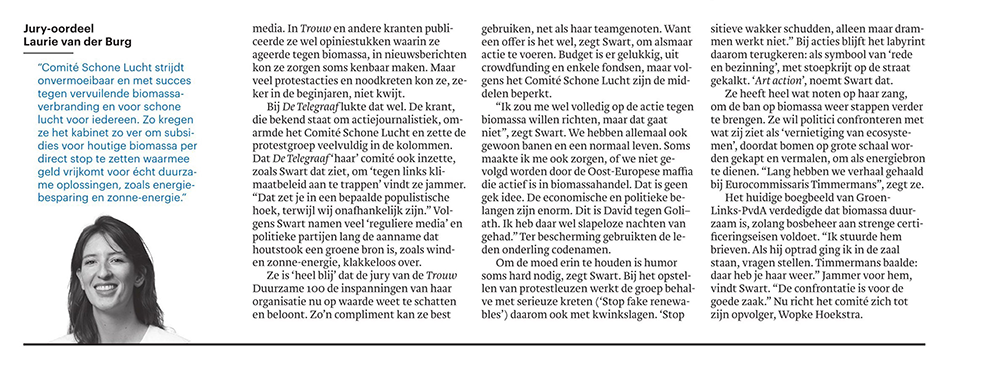
12 October 2023
The obstacle to green is Timmermans himself
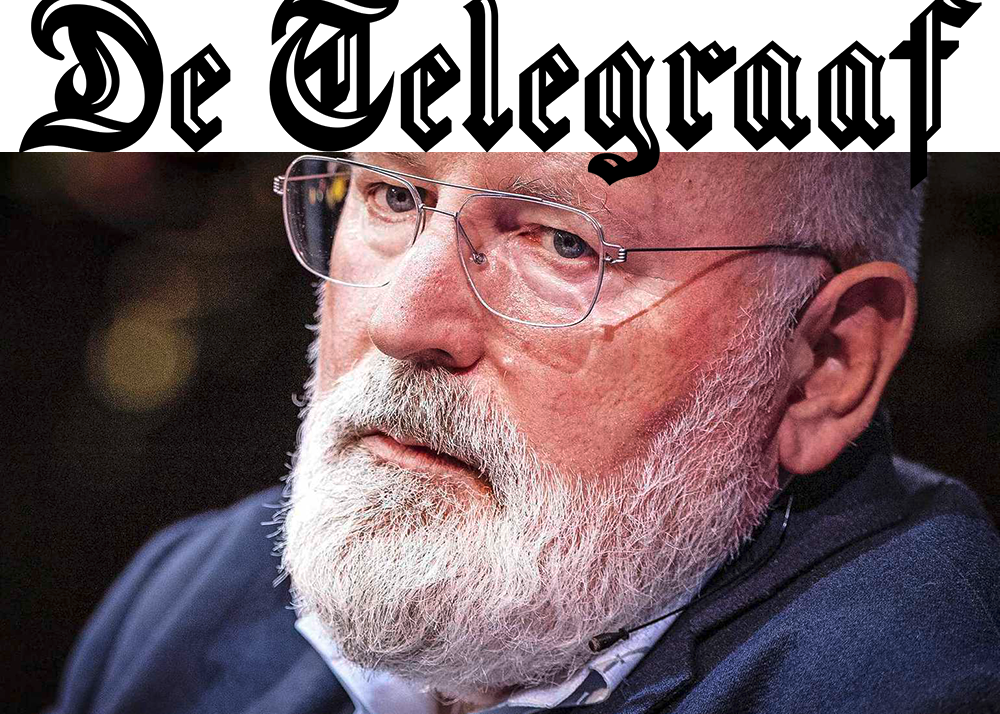
At the initiative of Frans Timmermans in his recent role as Eurocommissioner, Brussels is pushing for biomass. As leader of the Dutch green/ socialist party (GL/PvdA), Timmermans faces the task of advocating the end of biomass. Inexplicable, thinks Fenna Swart.
After almost ten years in Brussels, Frans Timmermans is leaving his international career for the Dutch leader position of the (newly combined list)Greens/ Social Democrats. Upon his departure from Brussels, many praised his progress on European dossiers of environment and climate legislation. The latter, if nothing else, would make him suitable as the new leader of the Dutch, new Socialist Greens. But with his return to national politics, his credibility and that of the “greens” is at stake. ‘That one day you wake up on the floor with a tattoo on your face and a tiger in the bathroom, we have to take action now’. This is how Timmermans described his fear of ending up as a politician in 2017.
Trust
This month, at the start of the election campaign, Timmermans argues that citizen confidence should be the starting point in government as a condition for trust in the government. Set against Timmermans’ recent actions and European legacy, these are remarkable words. In addition to focusing on climate, Timmermans is focusing on nature legislation in Brussels. Ambitious and courageous, it seems. But his actions within the new European Renewable Energy Directive this year speak a different language. Biomass must in fact, according to Timmermans, remain a subsidized part of this. Not long after, the first twist follows. After years of denying reported abuses of clear-cutting, Timmermans admits, when asked, in a crowded room of Amsterdam students, that Baltic forests are being cut down for wood pellets. Yet even after this, he continues unabated to push and even expand biomass on the European agenda. Last spring, Timmermans promotes a new plan called REPowerEU. Russian fossil fuels, he says, should be replaced with biomass alongside accelerated investments in wind and solar. Again, striking timing. The European Environmental Commission has just indicated doubts about biomass as a climate solution and is calling for moderation. Timmermans is pushing ahead. Biomass is again included in the “sustainable” directive, early this year. Effect of this is catastrophic for nature and climate. From this moment, current estimates show a steady increase in subsidized biomass until at least 2040. More than ever, under EU rules, forests are being burned on a global scale, in the name of climate. And Timmermans’ European legacy is palpable. Also in the Netherlands. Almost all mainstream media (except De Telegraaf and PowNed/De Hofbar) and political parties (except Party for the Animals) blindly follow the Brussels biomass rhetoric: “biomass is sustainable”. But Timmermans has new ambitions and pivots. The election program of Dutch political party states that biomass plants should be ended and no new ones added.
Dialogue?
Against this background, citizens will wonder how credible the proclaimed transition is and above all, how green their leader is. It makes little sense for a European climate leader to fail to plant three billion trees and encourage forest burning for ‘green’ energy and then, as Dutch political leader, talk about restoring nature and climate. So a dialogue? Yes! But with a tiger in the bathroom and bare bottom. Green policy is badly needed, but please under the leadership of reliable leaders, based on the real story.
Read more: https://www.telegraaf.nl/nieuws/1636674056/het-obstakel-voor-groen-is-timmermans-zelf
29 September 2023
EU elects new leader, but is the priority on Climate or still party politics?
By Fenna Swart and Maarten Visschers (Clean Air Committee)
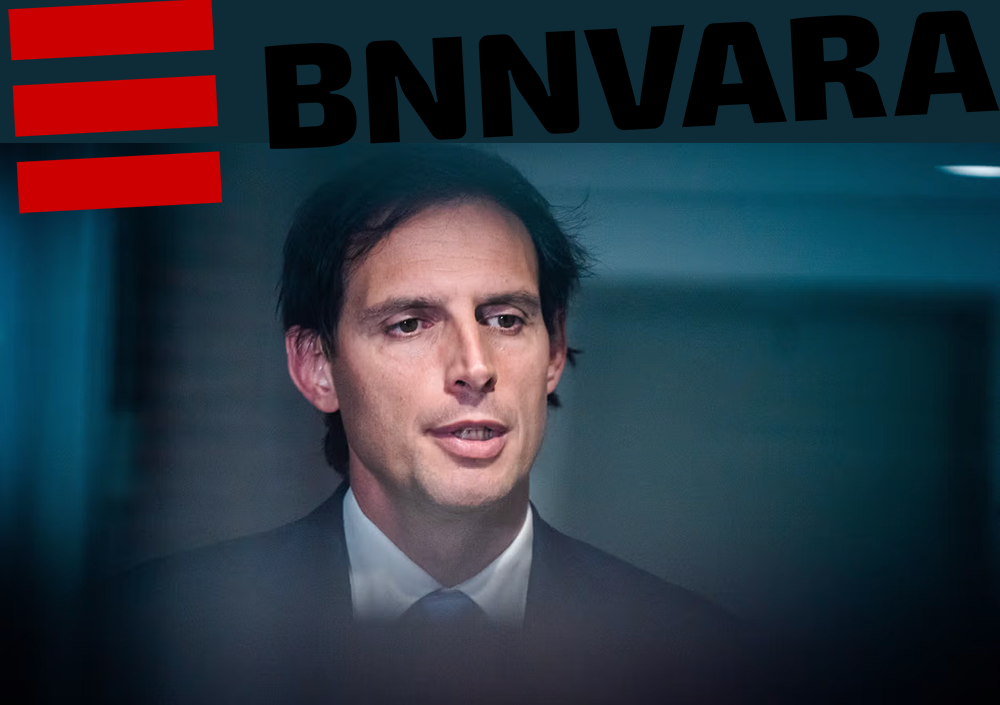
The outgoing cabinet, on the personal recommendation of outgoing Prime Minister Mark Rutte, has nominated Minister Wopke Hoekstra (Foreign Affairs) to succeed Euro commissioner Frans Timmermans in Brussels. According to Rutte, this nomination has support within both the cabinet and the European Commission in Brussels. The question is whether this is correct? Within the Cabinet, D66 was probably not enthusiastic. But also in Brussels and far beyond in Europe, protests are heard. Hoekstra’s fate is now in the hands of members of the European Parliament where Hoekstra will be heard on October 2nd. A refusal is rare but there is a precedent from 2019. This protest should be taken seriously and a refusal is justified. In the interest of climate and biodiversity goals and our earth as a whole.
Whether Wopke Hoekstra will also be appointed is not yet a done deal. The hearing on October 2 will be a crucial moment for MEPs to assess Hoekstra’s candidacy. A delegation of parliamentarians will then question the Commissioner-designate for three hours about his European plans. If they are not convinced in those three hours, a second session will follow.
Dubious track record
Hoekstra’s track record as an ex-employee of the oil industry and active player in the business world with no demonstrable knowledge or expertise on climate and biodiversity issues make him an unsuitable candidate for this role. But the main reasons against this appointment are 1. lack of leadership; 2. lack of integrity and conflicting interests; 3. unwillingness to invest in renewable energy, and 4. resistance to international climate agreements.
Economic interests over nature
Hoekstra’s party (CDA) is often criticized for its lukewarm stance on climate policy. Their proposals often prioritize economic interests over environmental considerations which is inconsistent with the European Union’s promise to become climate neutral by 2050. Like consistent resistance from the party to regularly invest in renewable energy sources and promote sustainable practices, with the exception of biomass burning which is by no means renewable.
Self subject of research
During the corona era, as finance minister, Hoekstra provided more than €3.4 billion in support to airline KLM and actively objected to the Dutch government’s goals to reduce emissions of nitrogen and thus methane, a potent greenhouse gas. As a Dutch senator, Hoekstra simultaneously worked for McKinsey, where he worked closely with the consultancy’s controversial clients, including major pharmaceutical, tobacco and fossil fuel interests. In addition, while a member of the Committee to Combat Tax Evasion, Hoekstra was himself investigated after the Pandora Papers made his shares public. But Hoekstra’s most notable political achievement regarding climate is that he himself was the target of a parliamentary inquiry into gas extraction Groningen, in which he pushed for the continued exploitation of oil and gas in the Netherlands. In doing so, he long opposed financial compensation for destroyed homes in the Groningen gas extraction area. And the compensation is still too little.
Priority nature, communities and species
The European Union plays a crucial role in global climate action, and the person appointed to this position must be able to fully commit to the Climate and Biodiversity agenda with high urgency, ambition and a deep understanding of its complexity. Europe needs a Climate Commissioner who prioritizes action to protect vulnerable nature, communities and species in line with the needs of Europeans, the climate and nature interests of the European Union and our planet as a whole.
10 October 2023
Final EU ‘renewable energy’ directive adopted
Boosting biomass forest harvesting remains in place but space description for damage limitation
Within the recommended version of the revised Renewable Energy Directive (RED III) adopted yesterday, Oct. 9, energy companies will still be allowed to cut down and burn forests for biomass on the basis of billions of euros in government support. This despite possible warnings from powerful, doctors, NGOs and European citizens about the disastrous effects on forests, climate and air quality. The summary is also allowed to count the energy produced toward their renewable energy targets.
It is incomprehensible that today’s decision maintains a policy for the continuation of low-grade use of wood (combustion), at the expense of established climate goals and the health of human, animal and nature. This policy goes against the EU’s own climate policy, reinforces the biodiversity crisis and air pollution, and reduces the wood supply of serious applications (for heavy applications, such as building materials, furniture industry). A striking feature of this directive is the importance of national legislation. Member states can decide whether to continue driving the biomass industry with subsidies. This provides space for European and Dutch citizens and forest protection organizations to convince politicians to make other and better choices.
Fenna Swart, chairwoman Clean Air Committee
Doubling share of renewable energy in 2030
The legislation, which was adopted after months of negotiations (so-called trilogues) between the European Council of Ministers, the Commission and Parliament, is of great importance to the energy sector because it sets targets and provides incentives to accelerate the development of renewable energy sources. The percentage of renewable energy (currently 22.5%) must be doubled (42.5%) by 2030.
Implementation manual
European forest protection organizations will soon publish an “Implementation Guide” outlining to EU member states how to implement the Energy Directives in a way that helps them address the climate and biodiversity crises. A more comprehensive analysis of the outcome of the negotiations can be found in the press release issued by Clean Air Committee indirectly at the end of the trilogues, March 2023.

Join us.
All expertise is welcome.
Send an email or follow us for the latest developments:
